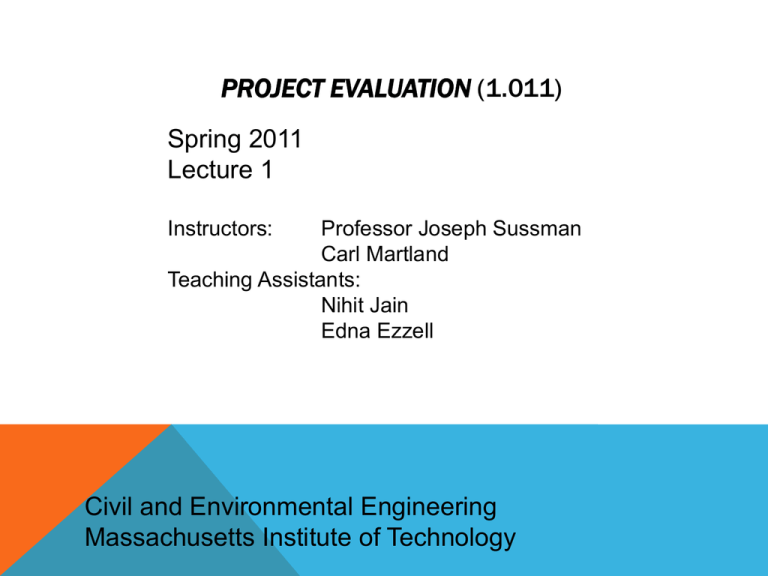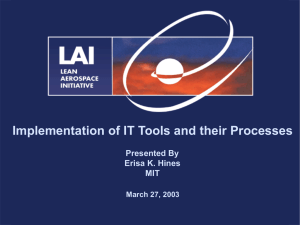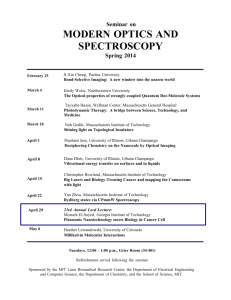PROJECT EVALUATION Spring 2011 Lecture 1
advertisement

PROJECT EVALUATION (1.011) Spring 2011 Lecture 1 Instructors: Professor Joseph Sussman Carl Martland Teaching Assistants: Nihit Jain Edna Ezzell Civil and Environmental Engineering Massachusetts Institute of Technology 1.011 Overview • Lectures/Recitations • Sussman, Martland, guests presenting case • Jain/Ezzell • Assignments (A) • Term project (P) THIS IS A CLASS ABOUT DECIDING WHAT TO DO. THAT’S WHAT ENGINEERS ULTIMATELY DO. THIS IS A CLASS ABOUT LARGE-SCALE INFRASTRUCTURE (FOR THE MOST PART) Civil and Environmental Engineering Massachusetts Institute of Technology Learning Objectives: Following this class, students should be able to 1. Effectively use basic engineering economics tools to evaluate major infrastructure projects 2. Understand when to complement this basic analysis with more sophisticated tools 3. Critique the process used to evaluate typical infrastructure projects 4. Understand a broad range of project types of relevance to CEE and related fields 5. Understand some ways in which project performance can be measured and improved 6. Understand the role of uncertainty in project evaluation 7. Do an ―end-to-end‖ project evaluation Civil and Environmental Engineering Massachusetts Institute of Technology ASSIGNMENTS • Written self-intros--professional interests, relevant experience, learning expectation (ungraded) A1.1 - Basic concepts I A1.2 - Basic concepts II A2 - Large scale project evaluation A3.1 - Advanced concepts I A3.2 - Advanced concepts II A4 - Peer Project Evaluations 1-pagers on guest cases--due the next class after the case lecture Civil and Environmental Engineering Massachusetts Institute of Technology TERM PROJECT • Work in teams of 2 or 3 • A project evaluation • Your choice, subject to instructors’ review Civil and Environmental Engineering Massachusetts Institute of Technology THE TERM PROJECT SHOULD BE ABOUT 15 PAGES LONG, INCLUDING: • • • • • • • Background on the project If a current or past project, a summary of the costs and benefits that were considered by decision-makers and how they were analyzed Major issues that affect(ed) the project Significant decisions that will be/were made regarding project design and implementation Status of the project and results if it has been completed Your own analysis of the relevant costs and benefits (if you choose an entirely new project, this will be the main body of your project) Discussion and critique of the project and the project evaluation process Civil and Environmental Engineering Massachusetts Institute of Technology PROJECT DUE DATES: Teams formed: Lecture 6 Project Description P1: (2pages): Due Lecture 10 P1 needs to address the following topics Provide a brief project description Why is the project interesting? What are the key uncertainties involved in the project? Civil and Environmental Engineering Massachusetts Institute of Technology P2 Due Lecture 17: Progress Report 1: (2 pages) P2 needs to address the following topics Identification of Stakeholders Identification of Benefits and Costs Data Sources you are using and any data problems you are encountering Civil and Environmental Engineering Massachusetts Institute of Technology P3 Due Recitation 10: Progress Report 2: (2 pages) P3 needs to address the following topics Project finance Major barriers to a successful completion of your written project Civil and Environmental Engineering Massachusetts Institute of Technology P4 LECTURE 23: Copy of powerpoint presentation due Lectures 23, 24, and 25: Presentations to class (participation points for constructive questions and comments from the audience) Civil and Environmental Engineering Massachusetts Institute of Technology P5 LECTURE 26: Final Report due at 11:59pm (last day of classes) Oral Presentations on term project-Mini-presentation (<7 minutes)--your initial ideas (during Recitation 6) Final presentation at end of term during Lectures 23, 24, 25 Meetings with 1.011 instructing staff -- to be arranged Civil and Environmental Engineering Massachusetts Institute of Technology Teaching Modalities: The intent is that the classes should be as interactive as possible. Occasionally it’s ―we lecture you listen‖ but we will endeavor to get you involved In lectures Methods and concepts Case studies to illustrate and expand upon methods and concepts ―Reports from the Front‖ (RFTF)—discussion of current events of relevance to 1.011 Also, we want you to learn from each other– student project presentations will comprise the last several lectures Civil and Environmental Engineering Massachusetts Institute of Technology In recitations Review and clarification of methods and concepts Discussion of problem sets/ quiz Project work Outside the classroom Each term project team (see below) will meet with the teaching staff several times during the semester Civil and Environmental Engineering Massachusetts Institute of Technology Student Work: Readings, as assigned Problem sets Term project Participation in class. Contributing to class discussion The class will have several guest lecturers discussing projects in their domain areas. You will submit a < 1-page summary for each case turned in the next class after the case is presented (whether you attend that case class or not) as a part of class participation. One in-class exam, open book and notes Civil and Environmental Engineering Massachusetts Institute of Technology READINGS Book: Carl D. Martland, Toward More Sustainable Infrastructure: Project Evaluation for Planners and Engineers, John Wiley, 2011 Other readings from: Davidson, Macroengineering Gawande, The Checklist Manifesto Other books Case Readings Professional papers and reports Reports from the Front Civil and Environmental Engineering Massachusetts Institute of Technology Civil and Environmental Engineering Massachusetts Institute of Technology MIT OpenCourseWare http://ocw.mit.edu 1.011 Project Evaluation Spring 2011 For information about citing these materials or our Terms of Use, visit: http://ocw.mit.edu/terms.



